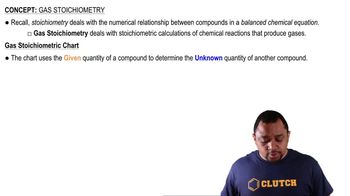A sample of N2O3(g) has a pressure of 0.017 atm. The temperature (in K) is doubled and the N2O3 undergoes complete decomposition to NO2(g) and NO(g). Find the total pressure of the mixture of gases assuming constant volume and no additional temperature change.

Verified Solution
Key Concepts
Ideal Gas Law

Stoichiometry of Gas Reactions

Dalton's Law of Partial Pressures

Binary compounds of alkali metals and hydrogen react with water to liberate H2(g). The H2 from the reaction of a sample of NaH with an excess of water fills a volume of 0.490 L above the water. The temperature of the gas is 35 °C and the total pressure is 758 mmHg. Determine the mass of H2 liberated and the mass of NaH that reacted.
In a given diffusion apparatus, 15.0 mL of HBr gas diffuses in 1.0 min. In the same apparatus and under the same conditions, 20.3 mL of an unknown gas diffuses in 1.0 min. The unknown gas is a hydrocarbon. Find its molecular formula.
A gas mixture composed of helium and argon has a density of 0.670 g/L at a 755 mmHg and 298 K. What is the composition of the mixture by volume?
A gas mixture contains 75.2% nitrogen and 24.8% krypton by mass. What is the partial pressure of krypton in the mixture if the total pressure is 745 mmHg?
